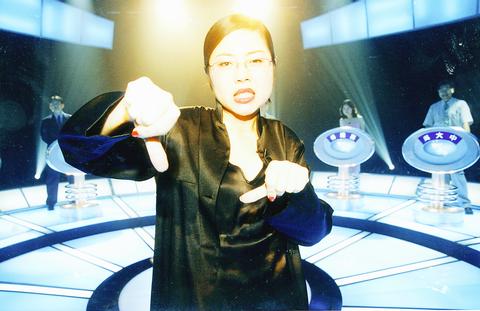The whirlwind that is the BBC's quiz show The Weakest Link has blown into Taiwan. Following in the footsteps of US television network NBC and broadcasting corporations from some 20 other countries, STAR TV Taiwan (
A prize of NT$2.2 million, the largest purse in Taiwan's television history, awaits any contestant who dares take up the challenge. The prize money has already lured several hopefuls for from around Taiwan. Several of the contestants in four pre-recorded episodes said they're currently unemployed and hoped to be able to take home the tempting prize.

PHOTO: COURTESY OF STAR TV
Only the masochistic need apply. Contestants in the the local version, like those of the US and UK, will have to answer to a most abusive host.
Belle Yu (
BBC's The Weakest Link began in the summer of 2000 and has attracted some 15 million viewers in Great Britain to date. The show was so successful, in fact, that NBC began the American version this spring, spending several million dollars to lure Anne Robinson, the show's UK host, into signing a six-year contract to host its US counterpart. Germany, Australia, Italy and Ireland are among the 20 other countries which have bought licenses for their own versions.
The game requires eight unacquainted contestants to team up and answer seven rounds of rapid-fire questions on general knowledge. With each question correctly answered, the team's winnings increase. Once a wrong answer is given, the pot returns to zero. Alternatively, the team can "bank" their winnings, but doing so will earn them less for correct answers in subsequent rounds.
Similar to the rules of reality television show Survivors, team members need to cooperate as well as compete with each other.
Each round ends with the tyranny of the majority -- a vote to jettison from the game the "The Weakest Link" on each team. Players who are voted out of the game face a walk of humiliation and leave with nothing but Anne Robinson's now classic tag line: "You are the weakest link. Goodbye!" Expelled contestants can later take their revenge backstage as hidden cameras look on.
Anne Robinson, the host of both the British and US versions, has won the title Rudest Woman on Television. Her bitter insults have become part of the lexicon of teachers and parents everywhere: "pathetic," "appalling," "shameful" and "stupid." She has attacked more than one contestant as being unfit for the challenge: "You're a coward, aren't you?"
And so for the show's Taiwan version, Yu is taking Robinson as her role model. She will be decked exclusively in black, never wear skirts, don scholarly-looking glasses and absolutely never, never smile. In order to look as icy as possible, Yu has even sought the help of a chiropractor, enduring hours of pain in order -- she says -- to have a thinner face.
"Pushing the contestants to the edge will be my responsibility," Yu said. According to Jason Hsueh (
The BBC has also set strict criteria for the making of the show's Taiwan version. The lighting, sound and set all had to conform to the original. The stage alone cost STAR NT$2 million, making it the most expensive stage for a quiz show in Taiwan's television history.

April 28 to May 4 During the Japanese colonial era, a city’s “first” high school typically served Japanese students, while Taiwanese attended the “second” high school. Only in Taichung was this reversed. That’s because when Taichung First High School opened its doors on May 1, 1915 to serve Taiwanese students who were previously barred from secondary education, it was the only high school in town. Former principal Hideo Azukisawa threatened to quit when the government in 1922 attempted to transfer the “first” designation to a new local high school for Japanese students, leading to this unusual situation. Prior to the Taichung First

The Ministry of Education last month proposed a nationwide ban on mobile devices in schools, aiming to curb concerns over student phone addiction. Under the revised regulation, which will take effect in August, teachers and schools will be required to collect mobile devices — including phones, laptops and wearables devices — for safekeeping during school hours, unless they are being used for educational purposes. For Chang Fong-ching (張鳳琴), the ban will have a positive impact. “It’s a good move,” says the professor in the department of

On April 17, Chinese Nationalist Party (KMT) Chairman Eric Chu (朱立倫) launched a bold campaign to revive and revitalize the KMT base by calling for an impromptu rally at the Taipei prosecutor’s offices to protest recent arrests of KMT recall campaigners over allegations of forgery and fraud involving signatures of dead voters. The protest had no time to apply for permits and was illegal, but that played into the sense of opposition grievance at alleged weaponization of the judiciary by the Democratic Progressive Party (DPP) to “annihilate” the opposition parties. Blamed for faltering recall campaigns and faced with a KMT chair

Article 2 of the Additional Articles of the Constitution of the Republic of China (中華民國憲法增修條文) stipulates that upon a vote of no confidence in the premier, the president can dissolve the legislature within 10 days. If the legislature is dissolved, a new legislative election must be held within 60 days, and the legislators’ terms will then be reckoned from that election. Two weeks ago Taipei Mayor Chiang Wan-an (蔣萬安) of the Chinese Nationalist Party (KMT) proposed that the legislature hold a vote of no confidence in the premier and dare the president to dissolve the legislature. The legislature is currently controlled